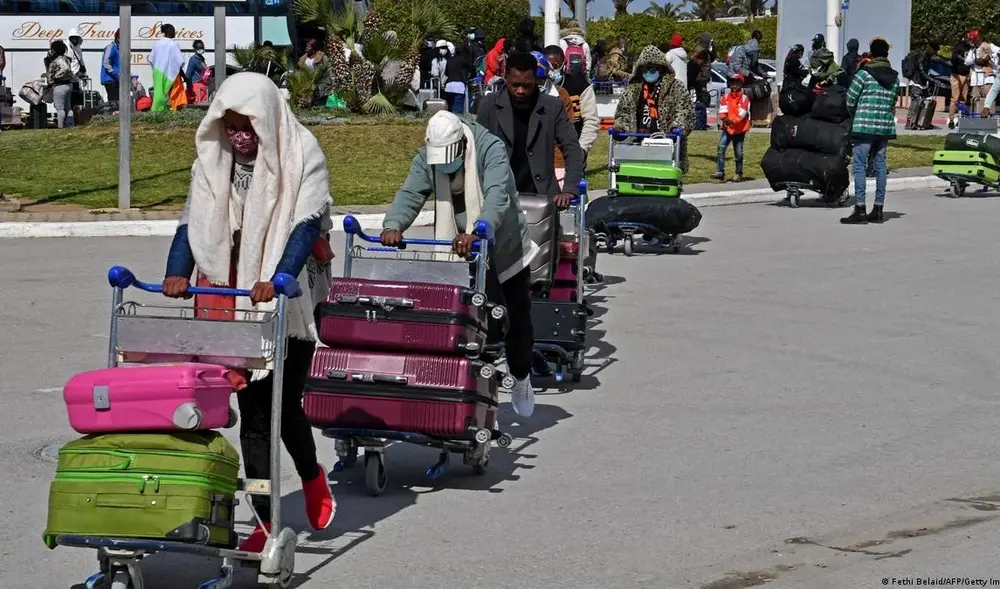Sub-Saharan Migrants in Tunisia: Systematic Racism or European Sway?

On 21st February 2023, Tunisian President Kais Saied shocked the nations in the region with a speech that claimed there was a "conspiracy" behind the influx of Sub-Saharan African migrants into the country. Critics have branded the speech as "racist" and dangerous because it called for harsh new restrictions that shocked migrants and increased their fears (Reuters, 2023a). President Saied emphasized the need for swift action to stop the flow of undocumented immigrants from Sub-Saharan Africa into Tunisia, highlighting how this fuels crime and violence. The President emphasized the urgency by referring to a criminal conspiracy that developed at the turn of the century of which is claiming that Tunisia's demographics are being altered by the settlement of illegal migrants from Sub-Saharan Africa. The President claimed that these successive waves of unauthorized migration have the covert intention of making Tunisia to be an African nation solely, with no connection to the Arab or Islamic identity. President Saied has demanded action at all diplomatic, security, and military levels. He has also called for strict enforcement of the limited rights of foreigners in Tunisia and illegal border crossings (Migrant News, 2023). According to his speech, President Saied said that those responsible for this phenomenon are engaging in human trafficking while professing to defend human rights. Hence, to what extent does the President’s speech indicate a new Tunisian policy against the large Sub-Saharan population? Furthermore, does the stance taken by the European Union, notably Italy, to halt the higher numbers of migrants coming from the region have an influence in Tunisia?
Tunisia as a Transit to Europe:
Similar to other Maghreb countries, Tunisia is a major transit point for migrants and refugees seeking to cross the Mediterranean into Europe, including growing numbers of Tunisians themselves and nationals of other neighboring North African countries (Mercy Corps, REACH, 2018). The number of Tunisians trying to immigrate to Europe has considerably increased since mid-2017, largely due to the country's high unemployment rate and the perceived lack of economic opportunities with the unemployment rate in Tunisia having reached 15% in June 2022 (Trading Economics, 2023). ACAPS has identified over 813,000 Tunisians (roughly 7% of the total population) living overseas, with 77% residing in Europe. Tunisians are presently the most common nationality among migrants arriving in Italy via the Central Mediterranean migration route, accounting for approximately 24% of all arrivals since January 2021. Although Tunisians make up the majority of migrants leaving the country, a growing number of migrants, refugees, and people seeking sanctuary from other nations have been arriving in Tunisia to then travel somewhere else, frequently to Europe. According to the statistics, more than 9,200 refugees and asylum seekers were being hosted in the nation as of 30 November 2021, coming from the Ivory Coast (38%) and Syria (27%). In Tunisia, migrants, refugees, and asylum seekers face barriers to accessing work, housing, and healthcare, as well as dangers like human trafficking and scams due to the lack of an official national asylum system that would ensure access to services and support (ACAPS, 2023).
Italian Influence and Externalization of Borders:
Italy and Tunisia are two sides of the interface of the Mediterranean‘s illegal immigration dilemma (Bridget, 2023; Reuters, 2023c). The European Union and specifically the Italian government, are working to assist Tunisia which are under a barrage of criticism and pressure due to their key location in the flow of illegal immigrantion across the Mediterranenean to Europe.
The massive waves of migration to Europe from Turkey and other south Mediterranean nations in 2015 prompted the European Union to rethink a new border policy to secure its sea and land borders. One action was to establish the EU Emergency Trust Fund for Africa (EUTF). However, rather than it being geared towards assisting in the integration of migrants who had arrived in the European Union, instead it was tasked to pinpoint the fundamental causes of irregular migration coming from Africa in order to discourage Africans from attempting to enter Europe (Grün, 2022). The EUTF's stated goals included addressing the core causes of irregular migration, preventing and combating smuggling and trafficking, increasing protection for persons fleeing their homes, boosting collaboration on return and reintegration, and expanding legal migration alternatives. Instead the goal has shifted to managing the flow of asylum seekers, refugees, and those who lack the required credentials or permits entering the European Union. As a result, the role of the European Union, its border externalization and its push backs strategy in halting migration from Sub-Saharan Africa through North African nations is called into question.
Gross-Wyrtzen & Yacoub have classified the North African nations as the first borders for the European continent where their borders are now being externalised across the Mediterranean. Hence, European policies aimed at preventing unwanted migrants from entering their borders utilise North African governments in the goal of transnational mobility control and to form new alliances (Gross-Wyrtzen & Yacoubi, 2022). History shows that similar events happened in Morocco where larger groups of West African and Sub-Saharan people came all the way to the north for the opportunity to cross the Mediterranean and gain access to Europe (Vox, 2017).
What are the Implications for the Region:
More than a month has gone by since President Saied made his remarks and the subsequent waves of protests objecting to the statement have not faded. The puplic‘s reactions varied from initial rejection and protest to calls for clarification and non-escalation. Many official justifications for President Saied’s statements have fallen flat. After public pressure, Saied's retreated on what he said and stated his speech was misunderstood. However, African newspapers continue to vilify and condemn his speech. The French edition of the daily „Africa News“ headlined „Tunisia: The Hell of Sub-Saharan Migrants,“ as the President’s words provoked hateful assults against many migrants with some ejected from their homes (Africa News, 2023). African nations and journalists reacted in a variety of ways to President Saied's words. The Ivorian daily „Koaci,“ for its part, called to boycott Tunisian products on social media with the hashtag „Boycott Tunisia“.The boycott movement is ongoing and prevalent in a number of neighboring countries, despite President Saied's retraction of his words. According to the financial weekly „Maliwab“, the actions of racism against black Africans in Tunisia are no anomaly, with similar behavior affecting Malians and Africans in other Arab nations in the continent's north (Africa News, 2023).
Experts see that the speech of President Saied on 21st February, as marking the beginning of the outbreak of violence against Africans in Tunisia, with implication in neighboring Maghreb countries such as Algeria, Lybia and Morocco (Al-Jazeera, 2023). Tunisian citizens reacted in two different ways, some groups supported the president’s speech, wheras other groups objected to it and called it racist. For the first group, the matter did not stop at resentment and anger towards migrants, but rather evolved into a demand for the deportation of illegal immigrants to their countries of origin, referring to the conspiracy of the new settlement project (Al-Jazeera, 2023). From the other side, many local human rights organizations objected to what the Tunisian president said and its impact on the Tunisian interior, stating that this type of speech inflames hostile feelings and leads to unbearable consequences. Human rights organizations, such as the Tunisian Forum for Economic and Social Rights (FTDES), condemned the speech, saying it „causes great disappointment and panic, and that this hate speech and racism represent a sad day,“ emphasizing that such a speech is extremely dangerous, especially coming from a head of state who has recently signed international migration treaties (Reuters, 2023b).
Outside of the country, many supranational and global organizations condemned the speech of the President. The African Union postponed a conference in Tunisia amid crackdowns on migrants and the World Bank suspend a partnership with a local Tunisian bank until further notice (Africa News, 2023). The Tunisian official authorities attempted to correct the negativity from the President’s speech, but it was too late. The international outcry has shown the President’s speech to be a siginificant political misstep. President Saied’s speech and the hateful impacts have tarnished Tunisia's reputation and caused significant harm to its interests, with thousands of students and patients potentially not select Tunisia or maybe even the North African Arab countires as a place for study and medical treatment. The situation in Tunisia is a mix of internal and external factor which President Saied’s speech exacerbated. Thus, the problem requires collaborative efforts between the Tunisian government, the European Union, and the countries of the region, in order to mitigate the negative impacts of the speech of the Tunisian President, to preserving the rights of migrants.
Cover photo: Fethi Belaid/ AFP/ Getty Images ‘‘Migrants have been fleeing Tunisia amid a wave of violence triggered by the president's tirade against irregular migration’’
Bibliography:
ACAPS. (2023, March 22). Migration in Tunisia. www.acaps.org/country/tunisia/crisis/mixed-migration
Africa News. (2023, 03). Tunisia: World Bank concerned about sub-Saharan migrants. www.africanews.com/2023/03/07/tunisia-world-bank-concerned-about-sub-saharan-migrants//
Al-Jazeera. (2023, July 3). American and international concern about the situation of African immigrants in Tunisia, and the authorities deny accusations of racism towards them. Al-Jazeera. www.aljazeera.net/news/2023/3/7/%D8%AA%D9%88%D9%86%D8%B3-81
Bridget, R. (2023, March 26). Italy To Plug Migrant Flows From Tunisia With Aid. European Conservative. europeanconservative.com/articles/news/italy-to-plug-migrant-flows-from-tunisia-with-aid/
Gross-Wyrtzen, L., & Yacoubi, Z. R. E. (2022). Externalizing otherness: The racialization of belonging in the Morocco-EU Border. Geoforum, 103673. doi.org/10.1016/j.geoforum.2022.103673
Grün, G.-C. (2022, April 12). How the EU spent billions to halt migration from Africa. Deutsche Welle. www.dw.com/en/how-the-eu-spent-billions-to-halt-migration-from-africa/a-61362906
Mercy Corps, REACH. (2018). Tunisia, country of destination and transit for sub-Saharan African migrants—October 2018. Mercy Corps, REACH. reliefweb.int/report/tunisia/tunisia-country-destination-and-transit-sub-saharan-african-migrants-october-2018
Migrant News. (2023, February 24). Tunisian president denies racism, repeats view that “migration is a plot.” www.infomigrants.net/en/post/47086/tunisian-president-denies-racism-repeats-view-that-migration-is-a-plot
Reuters. (2023a). African migrants suffer under crackdown in Tunisia. Reuters. www.reuters.com/world/africa/african-migrants-suffer-under-crackdown-tunisia-2023-03-01/
Reuters. (2023b, March 6). World Bank says pausing future Tunisia work amid reports of racist violence. www.reuters.com/world/africa/world-bank-says-pausing-tunisia-work-amid-racially-motivated-violence-2023-03-06/
Reuters. (2023c, March 24). Europe risks migrant surge without aid to Tunisia, Italy PM warns. www.reuters.com/world/africa/europe-risks-huge-migrant-inflows-without-aid-tunisia-italian-minister-says-2023-03-24/
Trading Economics. (2023). Unemployment Rate in Tunisia. Trading Economics. tradingeconomics.com/tunisia/unemployment-rate
Vox (Director). (2017, December 5). Europe’s most fortified border is in Africa. www.youtube.com/watch

About the authors:
Fouad Leboukh is an MPP student at the Willy Brandt School of Public Policy, specializing in peace and conflict studies as well as the management of non-profit organizations. Fouad has a master’s degree in Anglo-Saxon Studies from the University f Algiers 02. Prior to joining the Willy Brandt School, Fouad was an actor and also worked as a consultant for civil society organizations in Algeria, as well as in communications with local and international organizations.
LinkedIn: www.linkedin.com/in/fouad-leboukh
Twitter: https://twitter.com/fouad_leboukh
~ The views represented in this blog post do not necessarily represent those of the Brandt School. ~